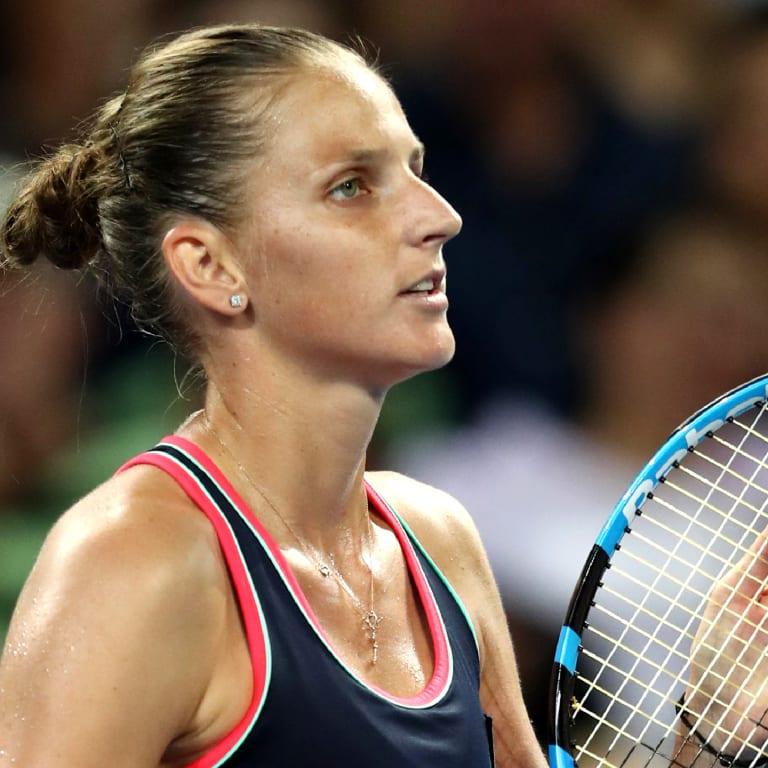Karol├Łna Pl├Ł┼Īkov├Ī Sparks Debate on Tennis schedule and Player Well-being
In a revealing Ōüópost-match discussion, former world No. 1 Karol├Łna Pl├Ł┼Īkov├Ī has stirred conversation within the tennis community byŌĆŹ expressing her concerns about what ŌĆŗshe perceives as an “overloaded” tournament calendar. ŌĆīHer statements follow a series of complaints from other players regarding the pressures ŌĆŹof theŌüŻ professional ŌĆīcircuit, Ōüżnotably after a demanding season filled with meaningful tournaments and high-stakes matches.ŌĆŗ Pl├Ł┼Īkov├Ī’s remarks stand out as ŌĆŹshe arguesŌüŻ that many athletes are enjoying unprecedented financial success,ŌĆŗ stating, ŌĆ£TheyŌĆÖre always complainingŌĆ” and paid more than ever.ŌĆØ This divergence in viewpoints raisesŌüó essential questions about the sustainability of tennis asŌĆī a sport and how to balance player welfare with theŌĆŹ lucrative opportunities available on tour. As discussions heatŌĆŗ up,scrutiny from fans,sponsors,and governing bodies is unavoidable.
Pl├Ł┼Īkov├Ī Questions Player Grievances Amidst Demanding Schedule
During her recentŌüŻ press conference, Karol├Łna Pl├Ł┼Īkov├Ī boldly ŌüŻaddressed ongoing complaints from fellow players about the strenuous demands of professional tennis.ŌĆī She pointed outŌüó that while athletes claim to experienceŌüŻ overwhelming Ōüómental and physical challenges, their earnings haveŌüŻ substantially increased over timeŌĆöprompting debate over whether their grievances hold merit. “TheyŌĆÖre always complainingŌĆ” and paid more than ever,”ŌüŻ she stated, challenging the authenticity of these elite athletes’ struggles.
Pl├Ł┼Īkov├Ī’s comments come at a time when discussions around an increasingly busy tournament schedule are prevalent; this often forces ŌüŻplayers ŌĆīto juggle their physical health alongside mental focus. she believes that rather ŌĆīof voicingŌüż dissatisfaction, players should cultivate resilience while recognizing theŌüó privileges associated with their status in sports. Key ŌüŻpoints include:
- Rising PrizeŌüż money: ŌüŻMany competitors now earn tens of thousands more compared to previous decades.
- Adequate Support Systems: Access to coaching staff, fitness training programs, and mental ŌĆŗhealth resources has improved significantly.
- Player Autonomy: Athletes have greater control overŌĆŗ managing their schedules and deciding which tournaments they wish toŌĆī enter.
Diving Ōüóinto her own ŌĆŗexperiences inŌĆī competitive sports history, Pl├Ł┼Īkov├Ī contended that feelings of fatigueŌĆöboth physical and mentalŌĆöare not Ōüóunique to today’sŌĆŹ generation; past erasŌüŻ faced even tougher conditions without similar support systems inŌĆī place. Given theseŌĆī insights, it might potentially be beneficial ŌĆŗfor stakeholders to closely examine athlete choices alongsideŌüż current realities withinŌĆŗ competitive sports for a moreŌĆŹ balanced understanding.
Financial ŌüóDisparities in Women’s Tennis Highlighted by Pl├Ł┼Īkov├Ī’s Comments
The recent observationsŌüż made Ōüżby Karol├Łna Pl├Ł┼Īkov├Ī regarding women’s tennis schedules have ignited broader conversations surrounding financial disparities within this realm. ŌĆīHer critique targets fellow competitors who frequently express dissatisfaction while simultaneously benefiting from increasing prize poolsŌĆöa situation that Ōüóraises vital questions about how earnings are distributed across performance ŌĆŹlevels.KeyŌüŻ pointsŌĆŹ derived from her remarks suggest discrepancies between performance realities versus payout structures:
- Sizable Prize Increases: Women’s tennis has seen considerable growth inŌüó prize ŌĆīmoney recentlyŌĆöespecially during grand ŌüóSlam events.
- Athlete Concerns: Numerous playersŌĆī haveŌĆī raised alarms regarding how taxing schedules impact both performance quality and overall health.
- Pervasive Perception Issues: According to Pl├Ł┼Īkov├ĪŌĆÖs ŌĆīoutlook, athletes need acknowledgment of their financial advantages rather than continuously lamenting their circumstances.
The ŌĆŹfollowing table illustratesŌüŻ growing disparities between earnings relative to ŌĆŹcompetition intensity based on 2023 prize money data for ŌĆŗtop tournaments:
| Tournament ŌĆŗName | total Prize Pool (Men) | Total Prize Pool (Women) |
|---|---|---|
| Aussie Open | $80 million | $80 million |
| french ŌüóOpen | < td >$62 million < td >$62 million < tr >< td >Wimbledon ŌĆŗ < td >$51 million Ōüż < td >$51 million < tr >< t d >US Open < t d >$65 million ŌĆŗ < t d >$65 million
This ŌĆŗfinancial parity has become central in advocatingŌĆŗ for women’s rights within sports; though,the ongoing dialog underscores challenges faced by ŌĆīathletes both insideŌĆöandŌĆŗ outsideŌĆöthe court surroundings.Pl├Łskov├ĪŌĆÖs insights serve as reminders that although monetary Ōüóinequalities seem lessening,the endurance required mentallyŌĆöandŌĆī physicallyŌĆöfor these competitors remains crucially relevant especially amid modernŌüó sportingŌĆŗ complexities.
Striving for Balance: Recommendations for Sustainable Tennis Calendar & Player Health
The tennis communityŌüż is currently Ōüónavigating implications stemming from an increasingly congested schedule.Karol├Łna Pl├Ł┼Īkov├ĪŌĆÖs Ōüżforthright comments underscore critical conversations surrounding player well-being along withŌüó sustainability issues inherent within this sport.Among her key arguments was highlighting inconsistencies among complaints voiced by those enjoying lucrative contracts questioning if higher rewards ŌĆŗshould alleviate burnout concerns.< strong>“With rising prize funds,it becomes essential ŌüóforŌĆī players also consider maintaining optimal mental & physical wellness,ŌĆØ< / strong >she asserted.There exists an urgent need among stakeholders reevaluate annual calendars ensuring better ŌĆŗequilibrium between competition demands & ŌĆīrecovery periods allowing athletes perform optimally without succumbing excessive pressure resulting overloaded agendas.< / p >
To create healthier environmentsŌüó conducive towards athlete success,several recommendations could be proposed:< strong >
- Mandatory restŌĆŗ intervals implemented between competitions enabling adequate recovery times;
- A restructuring calendar reducing back-to-back event occurrences;
- CreateŌüż flexible scheduling optionsŌĆī accommodating those struggling physically;
- Mental health resources integratedŌüó into tournamentŌüŻ association processes;
Recent ATP/WTA meetings reflect growing interest optimizing balance competition well-being.HereŌĆÖs summary proposed changes:< / p >
Final Thoughts on Current Discussions Surrounding Tour Demands & Compensation Structures Within Tennis Community
Closing Remarks
Karolina Pli┼Ī kov├Ī ‘ s recent statements Ōüżinitiated necessary dialogues throughout entire sportingŌĆī community ŌüóconcerningŌĆī rigorous nature tour schedules coupled compensation Ōüóstructures .While numerous ŌĆīprofessionalsŌĆŹ voice frustrations related taxing ŌĆŹcalendars,Pli┼Ī kov├Ī ‘ s viewpoint encourages critical examination balancing athlete welfare against lucrative aspects modern-day professional athletics.As ŌüŻdebates persist,it remains uncertain how governing bodies will address pressing issues ensuring prioritization player well-being does not undermine viability tours financially.With seasons unfolding stakes remain highŌüż both organizers ŌĆīparticipants alike ŌĆīnavigating complexities evolving rapidly ŌĆŗchanging landscape sport .Add A Comment






